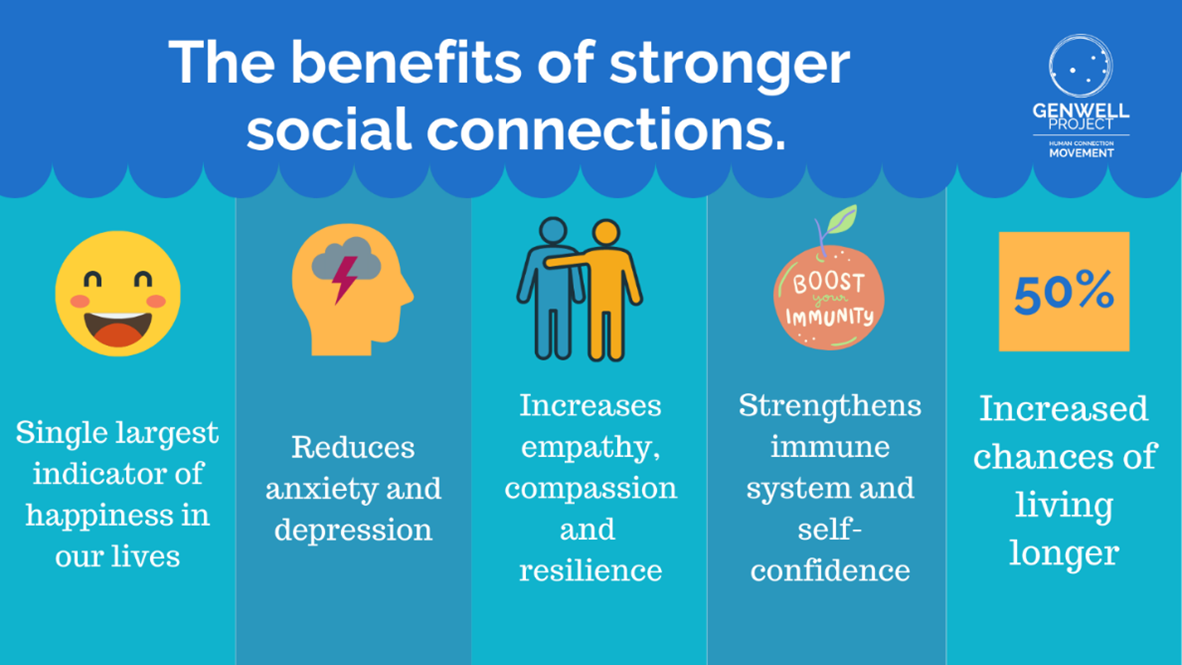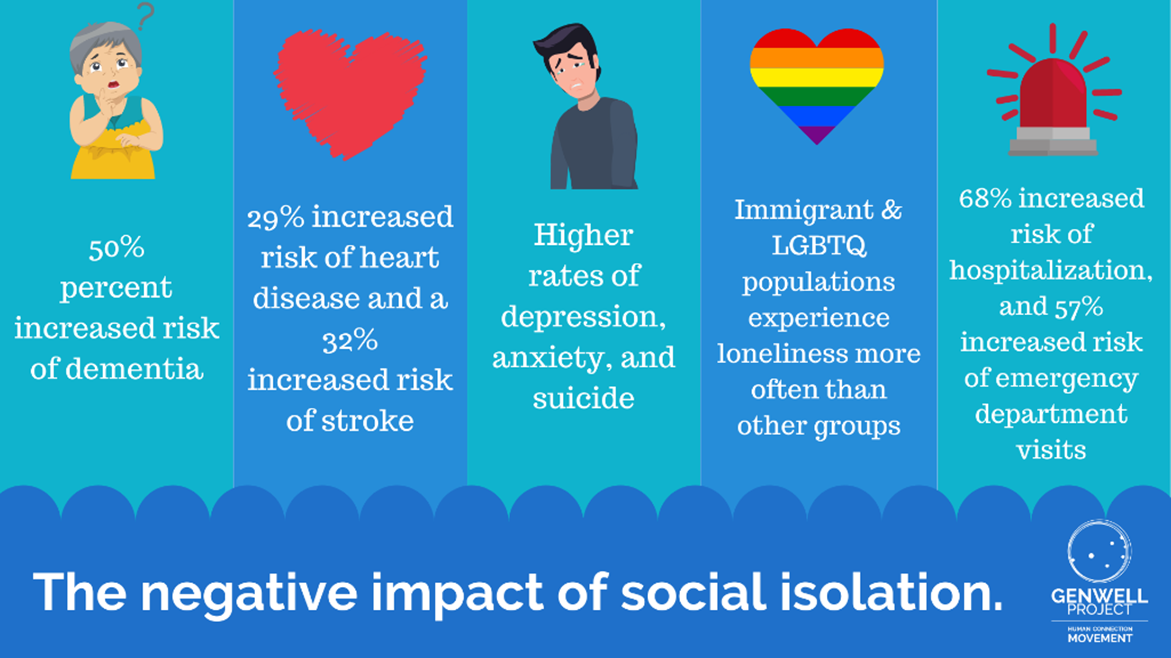
We need a Human Connection Movement right now…before the next crisis arrives.
Canadians value and understand why good nutrition and physical exercise are important to their overall health. While the Canadian government, health groups and health promotion leaders agree that these health concerns need to continue to be addressed, a relatively new and possibly more serious health concern is the emerging. There is growing evidence that our fundamental human need for social connection has serious impacts on our health. Indeed, research indicates that isolation, disconnection and loneliness is on the rise, and that a lack of human connection can be more harmful to your health than obesity, smoking and high blood pressure.
Indeed, research indicates that loneliness is on the rise, and that a lack of human connection can be more harmful to your health than obesity, smoking and high blood pressure.
In 1942 the Canadian government launched a proactive health program, later to be called the Canadian Food Guide, intended to be a focal point for a wartime nutrition program to improve the health of Canadians by maximizing nutrition during a time of food rationing and poverty. Food consumption surveys, although limited at the time, revealed problems such as poor access to food, insufficient money for food, and malnutrition in some populations. Canada’s Official Food Rules, also falling on the heels of the Great Depression, were billed as a long-term and comprehensive approach to “help everyone in Canada toward the health that comes from eating the right foods”.
In 1971, the Canadian government launched ParticipACTION, a proactive health program focused on promoting the benefits of physical fitness. The Canadian NFP emerged from Sport Participation Canada, in response to a 1969 study commissioned by the National Advisory Council for Fitness and Amateur Sport that found that the future of Canadian health was at risk from poor physical fitness and apathy on the part of Canadians. Initially seed funded by the Government of Canada, it later became a private and publicly funded program organized by an independent agency.
In both cases, the government saw the ill health effects on Canadians of not taking proactive steps to manage their health, but also recognized the long-term implications to the health care system and the increased costs associated with not taking preventative steps to keep people healthy.
The GenWell Project, a Global Human Connection Movement, was launched in 2016 in order to educate people about the importance of human connection to their health and to catalyze them to take action for their own health and for the health of those around them. Our goal in educating and catalyzing people was to assist in the development of supportive networks and communities before the next crisis, whether that was a personal one or a global pandemic. By activating around a couple GenWell Weekends each year during seasonal transition, we wanted to rally Canadians from coast to coast around a positive movement, the celebration of the benefits of human connection, and provide an excuse to gather with family, friends, neighbours and colleagues..
Surprisingly, most of us were never educated on the importance of human connection to our health, because until the end of the 20th century human connection happened more naturally. This is highlighted in Robert Putnam’s 2000 book ‘Bowling Alone’, which demonstrates that we have been increasingly spending less time connecting with one another in many aspects of our institutions and communities, for some time. Additionally, the advent of technology and faster lives have compounded the challenges that we face to stay connected today, by creating more distractions to young and old alike, and keeping us away from the casual play and connection that happened more often in the past.
“There is robust evidence that social isolation and loneliness significantly increase risk for premature mortality, and the magnitude of the risk exceeds that of many leading health indicators”.
Psychological theorists like Abraham Maslow, have long ago recognized that human connection or “love and belonging”, are a critical human need. Numerous researchers over the last 30 years have validated that human connection, or the lack thereof, can have negative impacts on our health. Julianne Holt Lundstat of Brigham Young University, is one such researcher who has been championing the message after her 2010 study which established poor social support as a major contributor to morbidity. She stated, “There is robust evidence that social isolation and loneliness significantly increases risk for premature mortality, and the magnitude of the risk exceeds that of many leading health indicators”. She has also compared isolation and loneliness to the risk of smoking up to 15 cigarettes a day and highlighted that it’s risk, “exceeds the risk of alcohol consumption, it exceeds the risk of physical inactivity, obesity, and it exceeds the risk of air pollution.”
Here are a few of the benefits of human connection researched to date:

Two recent studies that have come out during the COVID-19 pandemic, highlight the following insights:
- Social connection is the single greatest preventative action that any person can take to avoid depression.
- Loneliness is associated with a 46 percent greater chance of developing type 2 diabetes.
Although listing the negative insights and implications to social isolation, disconnection and loneliness may seem repetitive, we do so as we believe it is a critical part of becoming more aware of the devastating impact of this health crisis. They include:

When people don’t understand the true benefits of human connection, they often only seek each other out during times of crisis and miss the opportunity to benefit from it as a preventative, ongoing health measure that keeps us happier and healthier.
For many years organizations have been doing great work connecting people through various lenses, but potentially underplaying the full benefit of the connection itself, likely because the research was not complete or available. When people don’t understand the true benefits of human connection, they may only seek others out during times of crisis and miss the opportunity to benefit from human connection as a preventative, ongoing health measure that keeps us happier and healthier. For some, the opportunity in a deeper understanding is the recognition of the positive impact that they can have on themselves, but for others it may be a about the recognition of the impact that they can have on those around them. We all benefit from greater human connection in our lives and governments, businesses, communities and individuals can no longer wait until people find themselves in a crisis or an emergency room, before we take action.
As the old adage suggests, “an ounce of prevention is worth a pound of cure.”
At four years old, The GenWell Project and the Human Connection Movement is still in its infancy, however the events of the last 8 months have increased the attention, awareness and the need for a Human Connection Movement and catalyst that inspires us all to start building healthy connection habits starting today. By educating Canadians from coast to coast about the benefits of human connection as a preventative action that can help keep them happier and healthier, we can support each other, those in need, and the heath system all at the same time. As the old adage suggests, “an ounce of prevention is worth a pound of cure.”
Human connection transcends all ages, causes, illnesses, crisis, cultures, and more. The pandemic has given most of us a taste of what isolation, disconnection and loneliness can feel like and the opportunity is now to entrench the understanding and the solution. We must continue to support those in immediate need, but now is the time to focus on what is ahead and do our best to prevent the crisis that is likely to come. Governments have their attention focused, in the short term, on fundamental human needs and supporting our economy, but now is the time for business leaders, foundations, communities and individuals to be part of the longer-term solution, whether through financial support, participation or simply sharing the message. Building on the work that The GenWell Project has been doing since 2016 gives us a head start and together, we can more rapidly disseminate the information that everyone will benefit from. We truly are all in this together and together we can make the world a happier and healthier place by getting people connected face-to-face, even if that connection is virtual or through physical distancing, for the time being.
If you believe in the need for a Human Connection Movement, we are asking you to do the following:
1) Show your support of the movement by sharing this article with your community and giving your perspective about the need for a proactive health movement focused on human connection.
2) Follow The GenWell Project on our social platforms so you can receive daily tips, tools, ideas and inspiration to start building your healthy connection habits today, and be part of the solution to creating a happier and healthier world for all. Facebook, Instagram, Linked In, Twitter.
3) If you or someone you know is interested in playing a larger role in supporting the movement (booking a keynote, workshop, partnership or media), please reach out to us at [email protected]. All inquiries welcome.

